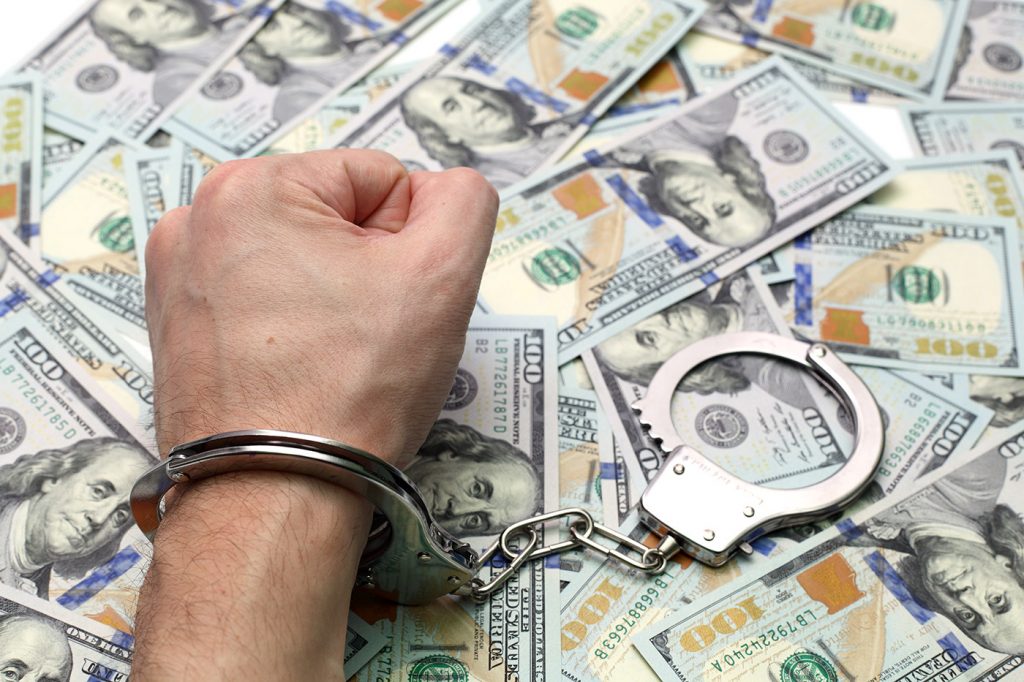Kalief Browder, an African American sixteen year old from the Bronx in New York City, was walking home from a party with his friend when he was stopped by police unexpectedly and charged with an alleged theft in 2010. The accuser, Roberto Bautista, was sitting in a police squad car and identified Browder and his friend as the thieves. The theft was a backpack that was said to contain $700 dollars, a credit card, and an iPod Touch. In his interrogation, with police, Kalief Browder insisted that he had not robbed anyone and that neither the backpack nor its contents would be found in his possession. Browder and his friend were then taken to the precinct where they were processed and taken to central booking. Within the following 48 hours Browder was interrogated and charged with robbery, grand larceny, and assault. At arraignment, bail was set at $3,000 dollars. If Browder’s family used a bondsman the amount would be ten percent plus fees or around $900 dollars for his bail to the bondsman. The bondsman would then post the entire bail amount with the court. The family could not pay $900 resulting in Browder remaining imprisoned at Rikers Island for the next three years.1


Debtors jail in colonial America was used to lock up those who owed money to the government. In today’s society, it translates into the cash bail system. 4 The for-profit bail system in the United States is used to keep those who are accused of breaking the law from harming anybody else or to be sure the accused will appear in court. If the accused is unable to pay the bail at the time of the arraignment, they may use a bondsman or they will remain incarcerated until their trial. For the poor, it is the latter. For Kalief Browder it was the beginning of the end. Only two countries in the whole world have a cash bail system, the United Sates and the Philippines. The cash bail system results in unnecessarily imprisoning citizens who do not pose as a threat to society and who most likely are not a flight risk. No pre-trial information is given to a judge before setting bail and there are no set standards on setting the amount for bail per case.5 Those who are wealthy enough to pay avoid the scarring effect prison has on one’s life. But for those who cannot afford bail, they face violence behind bars, debt, isolation, and at minimum a harsh punishment for those later found innocent, as in Kalief Browder’s case. This has created a two tier system in our judicial process. The first tier are wealthy offenders who can post bail and the second tier is everyone else who cannot afford equal justice or treatment.
Statistics show that 60 percent of people in jail from 2005 to 2015 were in jail awaiting trial. Three fourths of these individuals were accused of nonviolent crimes.6 This is alarming. On a national level, the United States imprisons persons who are essentially living in poverty and who are more susceptible to being involved or accused of a crime. In some instances, the court can grant “release on one’s own recognizance” or ROR. However, this is determined on a state by state standard. An example of this would be New York, the judicial system there would be more willing to grant ROR if the individual has a cellphone, has had a New York address for a year and has a job.7 These may seem like easy standards to meet, but consider those who are homeless, unemployed or cannot afford a cellular service on a regular basis. Their fate rests upon pre-trial bail. The bail money that the defendant does not have, requiring a bondsman, but not always attainable either.

- Johnson, Stephon “‘Time: The Kalief Browder Story’ Shows Failure of Justice System” New York Amsterdam News, March 2, 2017 http://blume.stmarytx.edu:2048/login?url=http://search.ebscohost.com/login.aspx?direct=true&db=a9h&AN=121613807&site=ehost-live&scope=site. ↵
- Schwirtz, Michael, and Michael Winerip “Kalief Browder, Held at Rikers Island for 3 Years Without Trial, Commits Suicide” The New York Times June 08, 2015 https://www.nytimes.com/2015/06/09/nyregion/kalief-browder-held-at-rikers-island-for-3-years-without-trial-commits-suicide.html. ↵
- Schwirtz, Michael, and Michael Winerip “Kalief Browder, Held at Rikers Island for 3 Years Without Trial, Commits Suicide” The New York Times June 08, 2015 https://www.nytimes.com/2015/06/09/nyregion/kalief-browder-held-at-rikers-island-for-3-years-without-trial-commits-suicide.html. ↵
- Steinberg, Robin “Robin Steinberg: What If We Ended the Injustice of Bail?” TED (June 18, 2016.) Https://www.youtube.com/watch?v=3B24RaqA33k . ↵
- Lally, Sean “Can the U.S.Radically Alter Its Cash Bail System?” (October 23, 2017) https://attorneys.us/can-u-s-radically-alter-cash-bail-system/. ↵
- Gunasekera, Yousha “Bail Means Jail: Debtor’s Prison for the Unconvicted.” Progressive 81, no6 (August 2017): 56–59 http://blume.stmarytx.edu:2048/login?url=http://search.ebscohost.com/login.aspx?direct=true&db=a9h&AN=123986116&site=ehost-live&scope=site. ↵
- King, Elizabeth “Inside the Fight to End Cash Bail” Pacific Standard January 08, 2018 https://psmag.com/social-justice/meet-the-reformers-taking-on-alec-to-end-cash-bail. ↵
- “Bail Bond Services for Waco, Texas” Kocian Bail Bonds December 14, 2015 https://www.bailbondskocian.com/. ↵
- “Bail Reform” Official Website – Assemblyman Rob Bonta Representing the 18th California Assembly District (March 29, 2018) Accessed September 21, 2018 https://a18.asmdc.org/article/bail-reform. ↵
- Gonnerman, Jennifer “Before the Law” The New Yorker December 08, 2017 https://www.newyorker.com/magazine/2014/10/06/before-the-law. ↵



123 comments
Bruno Montes de Oca
I personally am really interested in criminal law and I was very intrigued when reading this article. I have never thought of bonds this way ever. I knew how they worked and how some people are not able to pay their bond, but the statistics are unbelievable. The fact that three-fourths of all people awaiting trial in jail are being held for non violent crimes is inexcusable. These people do not pose a threat to the community, but maybe in the instances that they do there should be more oversight into seeing who gets put in jail awaiting trial. Not only because of the well-being of the accused, but also at the end of the day it will cost the government more to have the not guilty locked up before trial.
Emily Jensen
It is very ironic that our justice system is based on the innocent until proven guilty mentality, but still ends up with situations where innocent people are assumed guilty just because they have been accused of a crime. It is good that you are educating on the for-profit cash bail system, not many Americans fully understand the system. Congratulations on having your article nominated for an award by the way, a well-deserved nomination.
Julissa Cantu
The for-profit bail system within the states and the Phillippines is an important issue to tackle as it affects the majority of people as these are the individuals who do not have the money for these luxuries. The problem that I saw within the article was the weak argument cemented against the for-profit system. This is not to say that I agree with the unfair system, however, such a strong topic calls for a stronger argument. This article could also benefit from a stronger conclusion.
Cooper Dubrule
There are many situations just like the one Kalief Browder, where a person will be jailed before their trial due to the fact that they cannot afford the bail. Many times the repercussions of this go far beyond time wasted in a jail cell. The problems can effect a persons livelihood, from causing them to lose their jobs and spent time away from their families even though they may not necessarily be guilty.
Adam Portillo
I really felt the message that this article tries to convey to the reader. The article does a good job discussing one of the many flaws in the American Justice system. It definitely shows how the Justice system is unfair in many cases. I feel like the bail system needs to be looked at more because it’s unfair to people who don’t always have the money to pay for bail while it favors the wealthy. Awesome article.
Robert Freise
Congrats on this article for the nomination. I love the images and the title due to the money. It is terrible how parts of our legal system is corrupt and peoples lives are ruined in the process. It is a problem that needs to be fixed and dealt with. In all this article was very well put together and I loved how each paragraph sort of flowed to the next. This was truly a great article!!
Kacey Diaz
I think this article was very informative and educational. Not a lot of people know about how the bond process in jail’s work so it’s very shocking to read about it. It’s sad that Kalief Browder and his family had to suffer for three years and I see this as a big flaw in the legal system. Browder was misrepresented which resulted in him suffering trauma, eventually leading to his death by suicide.
Avery Looney
This article was very interesting and informative. Before reading this I had never given bail much thought but after reading this article I have come to the realization that our system is not fair to everyone. The story of Kalief Browder is tragic, because he was unable to make bail he had to sit in prison for three years for the system to eventually declare him innocent. Browder lost many things by being imprisoned, he lost his time and eventually lost his life due to the trauma he suffered inside prison.
Madison Guerra
This is such a great article and has such a deeper meaning behind it. I fully support that this article was nominated for an award. The story about Kalief was very sad but it served a good purpose in introducing the meaning behind the “Freedom for Sale” title.
Megan Copeland
I have never heard about this story before and I am glad I read this article. I think it is so sad that if your family can not find the money to post bail that you will most likely be incarcerated for the crime you were accused of committing. I feel so bad for Kalief Browder and his family because those people ruined their lives. I hope this never happens again, but sadly, I know it will. I think it’s crazy that people have to wait so long for their trial.